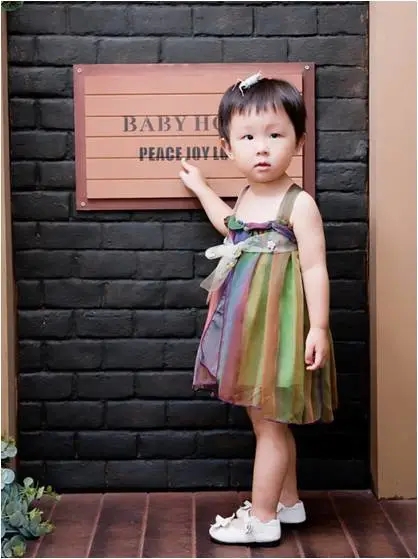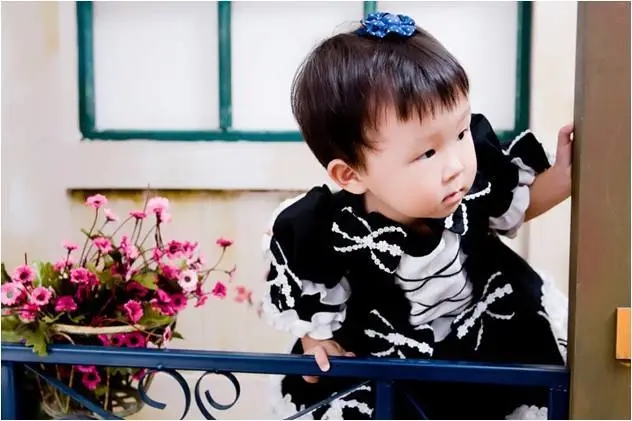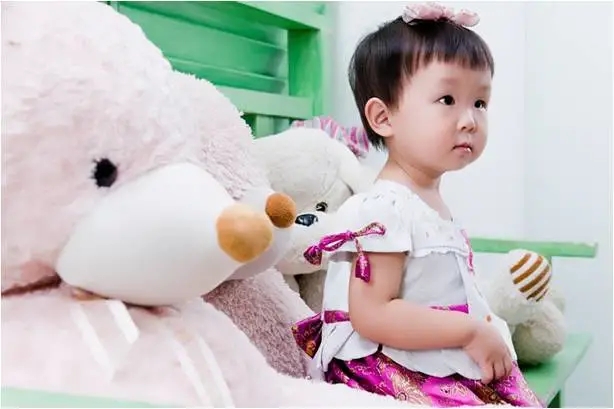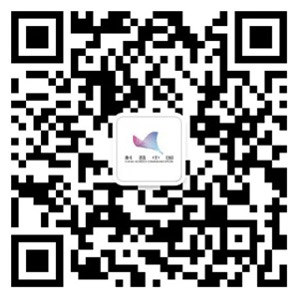这是 达医晓护 的第 2804 篇文章
上一篇我们介绍了宝宝从15月龄到18月龄各阶段发育的科普。本次的主题是接着一起来看看18到24月龄的正常发育轨迹,如何促进宝宝的发育,以及在什么情况下需要引起重视去看医生。
 情感发育
情感发育
在这个年龄阶段,宝宝开始体验和经历新的情绪,比如愤怒和挫败感,内疚,羞耻,占有欲和兴奋。对于孩子来说,这些“大”的情绪可以说是比较难处理的,你可能会看到宝宝因此而发脾气。另外,宝宝也开始思考自己关于他们自己的感受,并可能将感受与言语联系起来——例如,宝宝可能会告诉你他们“很伤心”。他们也可能会亲你一下或抱抱一个洋娃娃来表达心中的爱,这也是培养同理心的一部分。
在18个月龄左右通常是宝宝分离焦虑的高峰期,但到了2岁左右,这种焦虑就会逐渐开始开始好转。
日常生活技能
在这个阶段,宝宝开始喜欢而且迫不及待地要自己尝试独立完成更多的事情。
例如,学习自己用勺子吃饭和杯子喝水,而且比起以前到处洒一地的情况要好很多!宝宝还可能会在穿衣服和脱衣服时帮忙。脱袜子,鞋子和没有扣子的衣服对于这个年龄的孩子来说相对容易些。
一般来说,大多数孩子在2岁左右会表现出开始接受如厕训练的迹象,但有些孩子在18个月左右就可能会表现出准备就绪的现象。
游戏和学习
游戏很重要,因为孩子是在游戏和活动中学习知识和成长的。
在这个阶段,宝宝会开始通过角色扮演的过家家游戏来发展想象力和创造力——例如,假装从杯子里喝水,假装打电话给妈妈。随着孩子长大,角色扮演游戏会越玩越复杂,你可能会发现孩子在模仿学做一些家务,比如用树枝扫地。宝宝会喜欢和兄弟姐妹和其他孩子呆在一起,即使有时候并不是直接和别人一起玩。
说话
孩子们在这个年龄很喜欢学说话,甚至可能会有抑扬顿挫的上下音调,就像大人说话的语音语调。大多数情况下你很可能会听到是宝宝的“火星语”和真实单词的组合。
18个月龄时,宝宝开始进入学习词汇的 “爆发期”,一直在学习,通常一周学习1-2个单词,甚至可能会一天一个单词。宝宝可能会指着熟悉的物体说出名称,会说出人的称呼,身体部位,例如耳朵、鼻子或嘴巴。孩子可能会模仿类似 “moo”的动物声音,可能还会一遍又一遍地重复同样的声音或单词。
宝宝知道自己的名字和“我的”的意思。他们开始越来越善于理解简单的句子和指令,比如“把手机拿给妈妈”或“我们出去走走”。你们也开始会更多地听懂孩子的说话。
到了2岁,孩子可能会说“我”、“你”,并用2-3个词组成的句子——例如,“妈妈汽车”或“宝宝做它”。
活动
通常在18个月左右大多数宝宝可以自己走路并开始跑步。孩子可能会在帮助下开始上下楼梯或爬家具。扔球,踢球,用铅笔或蜡笔涂鸦,用积木搭建小塔,推倒搭好的积木,这些都可能是这个阶段孩子喜欢做的事情。
在18-24个月这个年龄阶段,宝宝可能还会:
在被要求做某事时说“不”
模仿你的动作或行为,比如帮你扫地
自己坐在小椅子上
拿着较大的物品四处走动
使用一只手比另一只手多些。
 如何促进18到24月龄宝宝发育?
如何促进18到24月龄宝宝发育?
1. 陪伴是最长情的告白:当宝宝在玩耍和探索新事物时,爸爸妈妈呆在边上陪着可以帮助孩子更有信心自己尝试新事物。这对于孩子长大后能变得独立和自信有益。
2. 创造机会让给孩子与他人玩耍:游戏是孩子交朋友和学习如何与其他孩子相处的好方法。但现在这个阶段不要指望他们学会分享和轮流玩-这是正常的,这个年龄的幼儿认为一切都属于他们自己的。
3.鼓励宝宝学习日常生活技能:生活中可以教并鼓励孩子使用勺子、从杯子里喝水和摘掉帽子等日常技能。这些技能的运用会锻炼到一系列大小肌群的的运动以及协调性,以及同时思考自己正在做什么的能力。
4. 陪宝宝说说话:和她交谈时告诉她日常生活中事物的名称——比如身体各个部位、玩具和家庭生活用品,如勺子或椅子,这样可以培养孩子的语言能力。在这个年龄,你可以教逐步地教你的孩子,比如一个“苹果”可以是一个“大苹果”、“红苹果”甚至是一个“大红苹果”。
5. 当孩子和你说话时,通过倾听和回答,让孩子觉得说话有意思。例如,孩子说“妈妈 牛奶”,你可以回答他,“你要妈妈给你拿牛奶吗?”这样就鼓励了双向对话,帮助孩子培养沟通能力,同时也会让他感到被重视和被疼爱。
6. 陪宝宝一起阅读:和孩子一起阅读、讲故事、唱歌和背诵童谣,可以鼓励孩子说话和培养他的想象力。
 在什么情况下需要引起重视去看医生
在什么情况下需要引起重视去看医生
如果观察到18月龄的宝宝有下述情况之一的,需要带孩子去看医生进一步评估。
看东西或听东西有困难
还不会说一个单词
不会指物、挥手或使用其他手势来表达
不会遵循简单的指令-例如,“请把球拿给我”
孩子和你没有眼神交流
不会独立行走
使用一个手明显大大多于另一个手 (通常婴幼儿在2岁前应该不会使用一侧的手多于另一侧)
如果观察到2岁的宝宝有下述情况之一的,需要带孩子去看医生进一步评估。
看东西或听东西有困难
不会说简单的连续的两个词的短语,比如“车车开”,“妈妈抱”
不会遵循简单的指令-例如,“请把球拿给我”
不会表现出他们的喜好或感情
不会过来寻求你的爱抚或安慰
不会模仿动作或语言-例如,当唱儿歌或童谣时
不会玩角色扮演的过家家游戏—例如,不会假装打电话
不会上下楼梯,哪怕是拉着大人或楼梯扶手
不会奔跑
不会涂鸦
What is happening during your toddler’s 18-24 months
Feelings
At this age, toddlers start to experience new emotions like anger and frustration, guilt, shame, possessiveness, and excitement. These ‘big’ emotions can be hard to deal with for your toddler, and you might see some temper tantrums as a result. Your toddler is also beginning to think about how they feel, and might link feelings with words – for example, your toddler might tell you they are ‘sad’. They might show affection by giving you a kiss or hugging a doll, which is also part of developing empathy.
Although your toddler’s separation anxiety peaks at around 18 months, by two years it should start to settle down.
Everyday skills
Around this time, toddlers are keen to do more things independently.
For example, your toddler is learning to feed themselves using a spoon and cup, and maybe even a fork – there might even be fewer spills than before! Your toddler might try to help when getting dressed and undressed. At this age, it is easier for your toddler to take off socks, shoes and clothes without buttons.
Generally, your toddler might show signs that they are ready for toilet training from two years on. But it is not unusual for some children to show signs of being ready earlier, at around 18 months.
Playing and learning
Play is important because it’s how children learn.
At this age, your toddler will start imagining and creating through pretend play – for example, pretending to drink from a cup. As your toddler grows older, pretend play gets more complex, and you might find your toddler doing things like sweeping the floor with a tree branch. Your toddler will enjoy spending time with siblings and other children, even if they don’t play directly with others.
Talking
Children enjoy talking at this age. Your toddler’s words might even have up-and-down tones, just like an adult’s. You will most likely hear a mix of ‘babble’ and real words.
At 18 months, your toddler is learning words all the time – usually 1-2 words a week, or maybe even one word a day. Your toddler might name and point at familiar objects, people, and body parts – for example, ears, nose, or mouth. Your toddler might also make animal sounds like ‘moo’ or say the same sound or word over and over.
Your toddler knows their own name and the idea of ‘mine’. They are getting better at understanding simple sentences and instructions like ‘Bring the mobile to Mum’ or ‘Let’s go for a walk’. You will be able to understand more of what your toddler says to you.
By two years, your toddler might be able to say ‘I’, ‘you’, and use sentences with 2-3 words – for example, ‘Mummy car’ or ‘me do it’.
Moving
Toddlers usually walk on their own by 18 months and begin to run. Your toddler will probably walk up and down stairs or climb furniture with your help. Throwing and kicking a ball, scribbling with pencils or crayons, and building small towers of blocks might be some of your toddler’s favorite things.
At this age, your toddler might also:
ask for ‘more’ and say ‘no’ when asked to do something
copy you – for example, they might help you sweep the floor
sit themselves in a small chair
walk around carrying larger objects
use one hand more than the other by two years.
How to help toddler development at 18-24 months
Be there for your toddler: being nearby while your toddler plays and explores gives your toddler confidence to try new things on their own. This can help your toddler to be independent and self-confident later on.
Give your child the chance to play with others: play is a great way for your child to make friends and learn how to be with other children. But don’t expect sharing and taking turns just yet – it’s normal for toddlers to think that everything belongs to them.
Encourage everyday skills like using a spoon, drinking from a cup and taking off a hat. These skills involve both small and big muscle movements, as well as your toddler’s ability to think about what they’re doing.
Talk with your toddler: naming and talking about everyday things – body parts, toys and household items like spoons or chairs – helps develop language skills. At this age, you can teach your toddler that an ‘apple’ can be a ‘big apple’, ‘red apple’ or even a ‘big red apple’.
Give meaning to your toddler’s talking by listening and talking back. If your toddler says ‘Mama milk’, you might reply by saying ‘You want Mum to get you some milk?’ This encourages two-way conversation and helps your toddler build communication skills. It also makes your toddler feel valued and loved.
Read with your toddler: you can encourage your toddler’s talking and imagination by reading together, telling stories, singing songs and reciting nursery rhymes.
When to be concerned about toddler development at 18 months
See your pediatrician if you have any concerns or notice that your 18-month-old toddler has any of the following issues.
has trouble seeing or hearing things
doesn’t say any single words
doesn’t point, wave or use other gestures
doesn’t follow simple instructions – for example, ‘Please give me the ball’.
doesn’t enjoy eye contact or cuddles with you or isn’t showing their feelings.
Isn’t walking on their own
uses one hand a lot more than the other (usually children don’t use one hand more than the other until closer to two years).
When to be concerned about toddler development at 2 years
See your pediatrician if you notice your two-year-old has any of the following issues.
has trouble seeing or hearing things
isn’t using two words together
can’t follow simple instructions – for example, ‘Please give me the ball’.
isn’t showing their feelings
doesn’t come to you for affection or comfort
doesn’t copy actions or words
doesn’t pretend during play – for example, doesn’t pretend to talk on the phone.
can’t walk up and down stairs, even if holding on to you or a rail
can’t run
isn’t scribbling.
作者:澳大利亚墨尔本大学医学院儿科博士
百汇医疗(中国)儿科医师
蒋本然




 扫码下载APP
扫码下载APP

 科普中国APP
科普中国APP
 科普中国
科普中国
 科普中国
科普中国